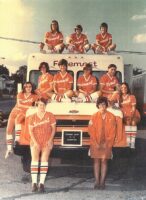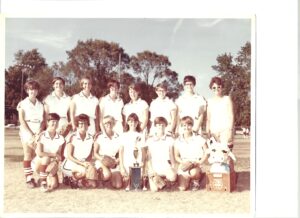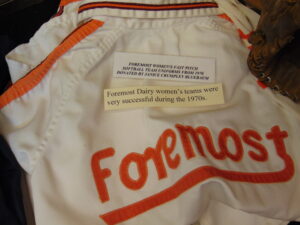Inductees
Foremost Dairy Softball Teams 1966-1975


It’s an iconic photograph, taken in the early 1970s, with softball players surrounding – and one player atop – a milk delivery truck marked Foremost.
Players are wearing orange and white uniforms, with knee-high socks. And, for folks who have passed by the photo at the Springfield Softball Museum at the Killian Softball Complex, it’s a window back in time.
That is, to a time when semi-pro fastpitch softball was in its infancy and about to lay the groundwork for what would become modern-day high school and college softball.
The photo? It’s of the Foremost Dairy Women’s Softball Team, which the Missouri Sports Hall of Fame is proud to induct with the Class of 2025.
Sponsored by Foremost Dairy, the program ran from 1966 to 1975 in Springfield and won two state championships, the Topeka Invitational, the Manchester Invitational and earned a third-place finish in Houston, Texas.

Overall, the team launched during an era when Ozarks companies were sponsoring men’s fastpitch softball teams. It was around that time when women on college campuses began organizing “play days” that included softball, with passage of federal Title IX legislation still a few years away in 1972.
“The desire to compete at a higher level of competition led to getting the sponsorship and talented athletes,” said Foremost player-coach Kay Hunter (MSHOF 2022), who later led Missouri State to seven AIAW College World Series, including the 1974 national title.
Foremost Dairy was composed of southwest Missouri talents, many of whom played several sports at Missouri State University.

The roster also included Sue Schuble, Linda Dollar, Carole Myers, Jan Trotter, Jackie Tekotte, Launa Goddard, Billie Jo Goodman, Cindy Henderson Snead, Nora Sousley Greenwade, Janice Crumpley Bluebaum, Diane Cline, Marlene Moore, Brenda Gunier, Laura Doran, Mary Shaefer, Mary Doyen, Irene Barnes, Reba Sims, Judy Bonnett, Debbie Bellman, Cheryl Feeback, Dana Aust, Debby Dace, and Fran Salsman and Kay Sterner.
Hunter, Schuble, Dollar, Snead, Bluebaum and Sims have been honored by the Missouri Sports Hall of Fame. Meyrs, Goodman and Bonnett have since passed away.
“Team members were recruited by simply watching them play in leagues, tournaments and in a back yard!” Hunter said.
Unlike modern-day college athletics, with athletes being paid, Foremost Dairy players and coaches competed without compensation. The milk company did cover uniforms, bats and travel expenses. Yet players had to fund their own gloves, shoes, special equipment and food.
They played on the Springfield-Greene County Park Board fields, usually at Fassnight Park and at Meador Park. They also traveled to tournaments in Manchester, Kansas City, St. Joseph, as well as out of state to Omaha, Neb., and Topeka, Kan. One trip took them to Houston, Texas.
For Hunter, the memories are endless. She still remembers watching a talented young girl pitch to her father in the back yard during a tryout. There was another time when a teammate got “the wind knocked out of her” on an usual tag at third base, with the benches emptying and Hunter having to corral Foremost Dairy back into the dugout.
Yet the most special part for Hunter was seeing the development of the players by the final season, and then what they went on to do to grow the sport. Several later coached young girls in softball, with some becoming coaches and umpires in Hunter’s Junior Miss Park Board Program.
“It was special knowing it was a new beginning of competitive play that would influence the competitive spirit of many young girls – especially ‘The Frosts Big Blue Team,’ a team that as coached by three of the Foremost players.”
Additionally, Foremost Dairy Women’s Softball opened eyes to the general public on what women could achieve athletically – and how they could be successful on the field, at the box office and on inspiring younger girls.
The sport certainly received a boost with the passage of Title IX, which required public schools to offer sports for women.
Locally, Foremost Dairy led to the creation of a women’s softball team at Missouri State and, in the 1980s, high schools that had added the sport were seeking coaches. The construction of the Killian Sports Complex – with the softball field featuring chairback seats – was a precursor to the impressive fields seen across NCAA Division I today.
“As a player/coach of the Foremost Team, on a scale of 1 to 100 or more,” Hunter said, “I would rate the effort, the camaraderie and forming of lasting friendships that have lasted a lifetime as 1 million!”